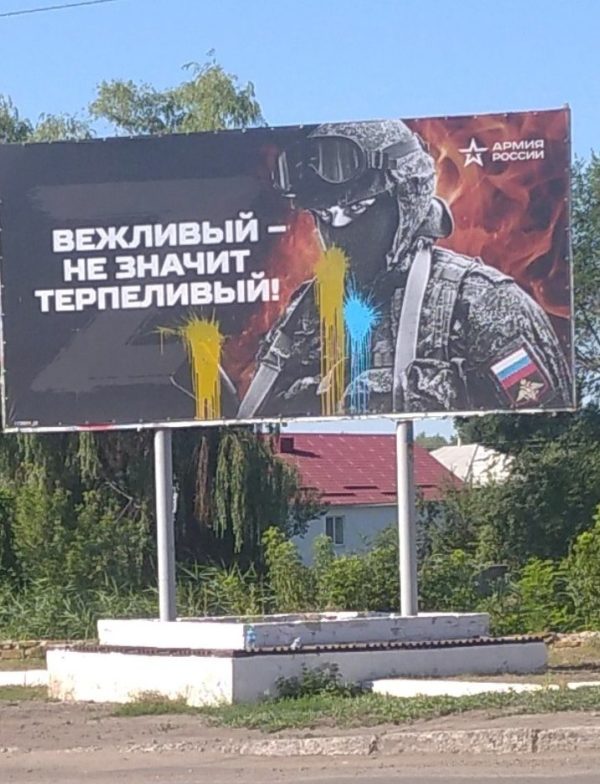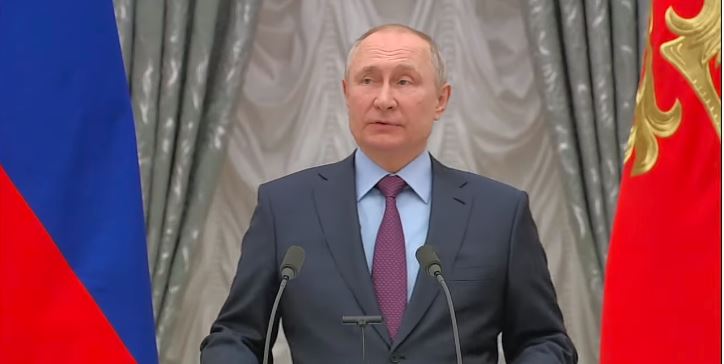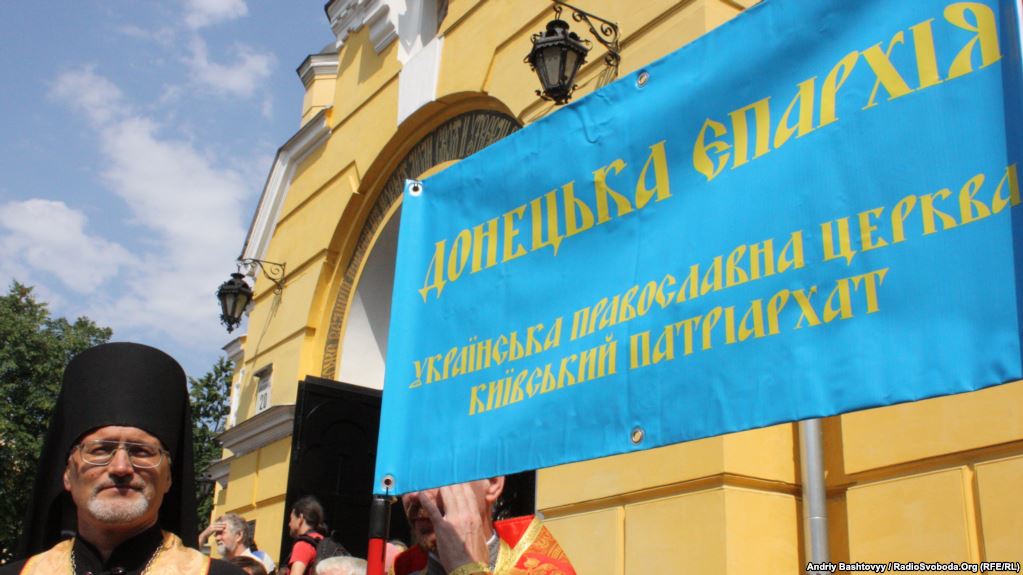First days: no warm welcome to Russian troops
The Russian troops that entered the northern Luhansk towns in the first days of Russia's full-scale invasion didn't see the warm welcome that they expected. Instead, local residents rallied under Ukrainian flags against the Russian occupation. https://twitter.com/EuromaidanPress/status/1499351008614440962 The town of Svatove saw three rallies: on 28 February local residents demanded that Russian troops leave the town, then on 3 March when the Russian military came again the townspeople made them leave again.On 8 March another pro-Ukrainian rally in Svatove didn't prevent the invaders from taking control of the town's administrative buildings and establishing the city and district occupation administrations. Similarly, the residents of Starobilsk tried to oppose the Russian occupation peacefully. The first rally took place on 2 March. Then on 6 March, they took down the "LNR flag" installed by the Russians and raised the national flag of Ukraine. https://twitter.com/EuromaidanPress/status/1500467271579414529 The Novopskov townspeople took to the streets two times to protest against the occupation. This is the Novopskov rally on 4 March: https://twitter.com/rescuero/status/1499715476460552193 And on the next day, March 5, the Russian troops opened fire on the protesters in Novopskov wounding five people.Russian "negotiators" claiming to represent "LNR army" came again to Svatove, headed by a drunk colonel, no military equipment. Said they wanted to "control city to maintain order." Locals said this not needed, Russians promised to stay at city borderhttps://t.co/ysTb7ACCdU pic.twitter.com/yvux7U2wEd
— Euromaidan Press (@EuromaidanPress) March 3, 2022
The anti-occupation protests also took place in other northern-Luhansk towns such as Bilokurakyne.In the town of Novopskov, Luhansk Oblast, the Russian military shot at a peaceful rally of local residents who were protesting against Russian occupation. Three men received gunshot wounds, one was beaten, TSN reported.
— Euromaidan Press (@EuromaidanPress) March 5, 2022
Terror, misery, collaborators
Trending Now
"There is no shooting in Svatove, but people disappear there, cars get stolen, streets [...] were renamed, banks and the taxation office were opened... Also, the occupiers go from house to house and look for Ukraine's Armed Forces, veterans of the ATO (Ukraine's 'anti-terrorist operation' in the Donbas, - Ed.)," Svativskyi Kryzhen reported in late April.At the same time, the Ukrainian authorities neither prepared the evacuation of civilians from the Luhansk oblast's north in advance nor did they attempt to evacuate the locals amid the unfolding invasion. Some people tried to leave their newly-occupied towns on their own. Up until mid-April, locals still could leave to the central-Ukrainian city of Dnipro by car or by bus. Then on 14 April, the Russian troops shelled two buses from Svatove in Kharkiv Oblast, killing 7 and injuring 27 evacuees. After that, not many locals dared to cross the front line.
"At first, to be honest, we had everything as before, except for the occupiers on the street," Svatove resident Serhii told Vchasno, "But over time, the situation began to change, people began to disappear, and there were very rapid metamorphoses in the structure of the city. At that moment, people were ready to go anywhere.., but all the roads were under fire... Men were virtually not allowed to leave, only women and children could."The Russian forces check people's IDs and mobile phones on the streets and take people "to the basement" for various reasons. Among their primary targets are Ukrainian veterans.
"Phones were also checked, I know that [Russians] used to take to the basement those who had photos with Ukrainian servicemen or of Russian military equipment. I personally also passed such a check, but I was lucky to have cleaned my phone in time," resident of a north-Luhansk settlement Yevhen told Tribun.Anyone can get behind bars for a picture with Ukrainian symbols on their phone, or for a social media post that the invaders wouldn't like.
"We have a guy in the city, an employee of the State Emergency Service - he was taken prisoner, kept for about a month in the basement, beaten, and abused. Now they have already released him, thank God. And nobody saw one ATO veteran after they took him away. They take people and hold them in the basement, and when those people get free they don't tell what happened there," Serhii said.

"Many people turned on a dime, both councilors and ordinary people. Some are just ambitious idiots who couldn't achieve anything under Ukraine, the others are a herd shouting: 'Whatever, as long as they're not shooting.' Those have been Surzhyk-speakers all their lives (Surzhyk is a Ukrainian-based mix of Ukrainian and Russian languages, - Ed.), and now they are trying to speak Russian," Svativskyi Kryzhen said.As of 2 July, about 100 former Ukrainian policemen of Svatove, Markivka, and Troitske districts swore allegiance to the Russian occupation forces. In the occupied territory, the Russian regime de-facto stripped the Ukrainians living in the occupation of the very basic of freedoms - the freedom of speech, anyone can end up in jail after saying anything diverging from the Russian propaganda narratives:
"No one feels safe here. Now you have to look around before you speak because there are such neighbors who will immediately run to 'LNR police' [to report on you]. The existence of a different opinion is prohibited, although there are those who argue even with the [Russian] military but at the end of the argument, they are still obliged to agree with the soldier's point. It is difficult to go from the mode of freedom to the 'keeping-your-mouth-shut' mode," Yevhen said.
Related:
- Western media again fall for Kremlin myth of “Ukrainian separatism”
- Russia sends Donbas musicians and historians as “cannon fodder” in Ukraine war
- Forced conscription: how Russia wipes out the male population of occupied Donbas
- On the verge of despair yet waiting for liberation: life in Kherson after Russian occupation – report
- Growing partisan movement of Kherson Oblast now bombs collaborators





